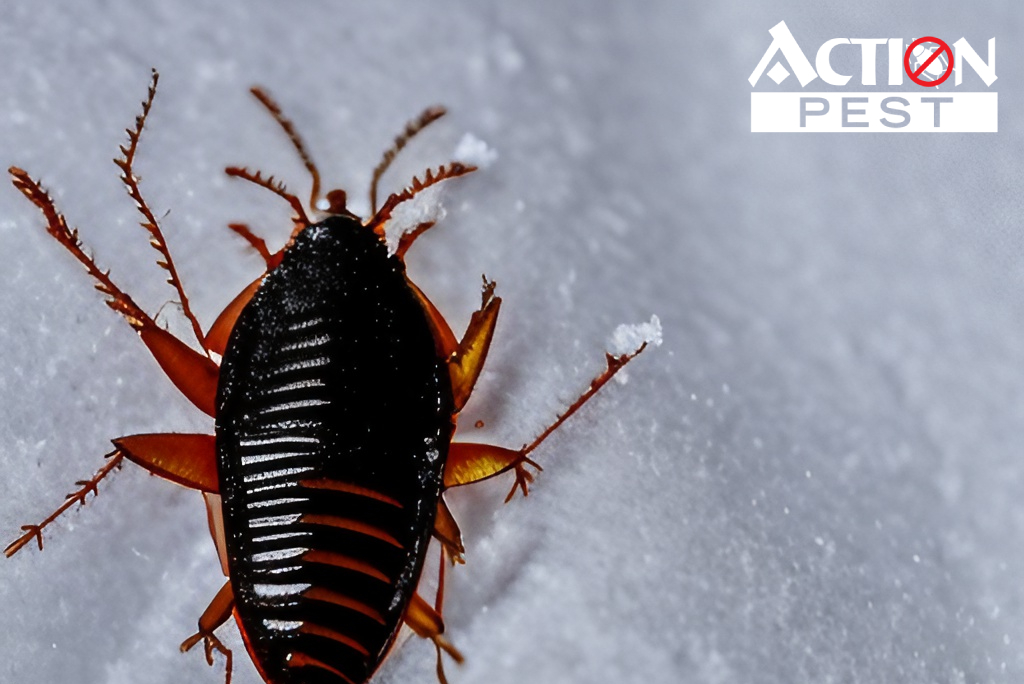Cockroaches’ Temperature Preferences
Ideal Temperature Range
Cockroaches, those uninvited house guests, know exactly what temps they’re after to party like rock stars. They love balmy surroundings, ideally between 85° and 95°F, with the kind of muggy humidity that makes your hair frizz. When it’s cozy like this, they’re not just chilling—they’re multiplying faster than rabbits on espresso during a heatwave (Quora). That’s why summer often means a cockroach invasion big enough to warrant its own miniseries.
| Temperature (°F) | Reproductive Activity | Survival Status |
|---|---|---|
| 85 – 95 | High | Living large |
| Below 40 | Low | Scrambling for heat |
| Above 115 | None | Waving a white flag |
Impact of Extreme Temperatures
Cockroaches don’t just dislike chilly temps—they absolutely despise them. Anything under 45°F pretty much puts a stop to their party, as they slow down their reproduction game and go on a hunt for a snug spot to hang out. If the thermometer plummets to between 15 and 0°F, it’s game over for these persistent pests (Quora).
On the flip side, crank the heat above 115°F, and cockroaches will be sweating bullets. They simply can’t handle the sauna-like conditions, with survival rates nose-diving when it gets this hot.
When the mercury rises, so does the roach activity. They get busy, leading to infestations that could make anyone lose their cool. But throw some extreme temps at them, and their days are numbered. When it’s too hot or too cold, roaches find it tough to keep up their usual antics.
For all the deets on cockroach life and times, like why they love a nighttime roam or how long they can last without munchies, check out our explorations on why do cockroaches come out at night and how long can cockroaches live without food. Facing a never-ending roach problem? Let’s help you out with how to stop cockroaches coming back.
Cockroach Species and Behavior
Gettin’ a handle on those sneaky little cockroaches and their knack for makin’ more of themselves is key to keep your home roach-free.
Common Cockroach Species
There’s about 4,000 kinds of cockroaches scuttling around this planet, but don’t worry—only a few like to crash at your place. Meet the usual suspects: German, American, Oriental, and Brown-Banded cockroaches. Each brings its own quirks and home preferences:
| Cockroach Species | Prefers To Hang Out | What Makes ‘Em Tick |
|---|---|---|
| German Cockroach | Loves cozy homes, especially warm and damp corners | They’re everywhere once they move in; tough eviction! |
| American Cockroach | Seeks heat indoors, digs wood piles and dead trees | Big fella, and can take to the skies! |
| Oriental Cockroach | Likes musty, wet nooks in homes | Popular in basements and crawl spaces |
| Brown-Banded Cockroach | Warm spots near appliances are their jam | Notable for those two light stripes on their wings |
Reproductive Behavior
Cockroaches ain’t slackers when it comes to makin’ babies. Take the German cockroach, for instance—just one can turn into 30,000 squirmy critters in a year. They thrive in warm weather ‘cause it makes ’em breed like mad.
| Cockroach Species | Egg Case (Ootheca) Count | Baby Roaches per Year | Baby-Makin’ Speed |
|---|---|---|---|
| German Cockroach | Packs 30-40 eggs per case | 30,000 baby roaches | Rapid |
| American Cockroach | 14-16 eggs per case | 800 baby roaches | Medium |
| Oriental Cockroach | 16 eggs per case | 200 baby roaches | Slow |
| Brown-Banded Cockroach | 10-18 eggs per case | 600 baby roaches | Medium |
When chilly weather sets in, these critters hit pause on growin’ and breedin’—it’s like a cockroach hibernation. But keep the thermostat high, and they’ll party on (Angi). For more cockroach love life details, mosey on over to how do cockroaches reproduce.
Cockroaches are the ultimate night owls, scuttlin’ around under the cover of darkness, steer clear of things with sharp claws or beaks, you know, like cats and birds. Fancy more on their nightlife? Check out why do cockroaches come out at night.
Gettin’ to know what makes cockroaches tick can give you the upper hand in keeping them out. For tips on how to keep these critters at bay, swing by how to find a cockroach nest and how to stop cockroaches coming back.
Cockroaches vs. Water Bugs
Getting a good grip on the differences between cockroaches and water bugs is the ticket to squashing your pest problems for good. Let’s peek into where they hang out and what they chow down on.
Environmental Preferences
These critters have their own chill spots. Where they like to kick back affects how they behave and how they spread out.
-
Cockroaches: These guys love warmth and humidity, making your cozy home a favorite playground, hanging out in crawl spaces, basements, and any cracks they can squeeze into. They party hard when the temps rise, as it helps them crank up those reproductive engines. They’re all about the heat, chilling somewhere between 77°F to 86°F, always on the lookout for warm and damp hangouts to keep their body temps just right.
-
Water Bugs: Unlike their land-loving cousins, water bugs groove to the rhythm of humid, hot climates, finding refuge in soggy, rotting wood or amongst leaves. Though they’re called water bugs, these critters aren’t swimmers—they gotta pop up for air pretty often. With a preference for moisture, they party around water spots.
| Insect | Preferred Environment | Temperature Range | Humidity Preference |
|---|---|---|---|
| Cockroaches | Indoors (crawl spaces, basements) | 77°F – 86°F | High |
| Water Bugs | Outdoors (rotting wood, leaves) | Humid, hot climates | High |
Feeding Habits
Both love snacking, but their menus are slightly different—finding the food first influences where they set up camp.
-
Cockroaches: Talk about a palate—cockroaches are not picky eaters. They’ll munch on pretty much anything organic—rotting food, plants, and even some unfortunate fellow insects. They’re night owls, doing most of their munching after dark, which is why they scatter when you flick on the lights.
-
Water Bugs: These critters are a bit more refined. Although they can be seen eating other insects and small aquatic creatures, their strong legs help them catch and hold their next meal. Not big fans of human food, but a water bug in your home might mean something fishy about your water quality.
For those knee-deep in creepies, knowing the home life and meal choices of your unwanted guests is key. Want to stomp out your pest problem? Check out our guides on how to get rid of these sneaky invaders and keep them from coming back.
Managing Roach Infestations
When dealing with those pesky cockroaches, a mix of preventing them in the first place and calling in the pros when things get out of hand is the way to go.
Prevention Methods
Stopping roaches before they move in means keeping your space clean, as messiness is their invite. Try out these methods:
- Eliminating Food Sources: Give roaches the boot by keeping kitchens spotless, storing grub in tight containers, and mopping up spills fast. These critters snack on everything—bread, glue, and even old skin flakes.
- Sealing Entry Points: Block the sneaky little blighters by sealing up cracks and gaps, especially when it’s hot out. Check our crack-sealing guide for tips.
- Removing Moisture: Dripping taps? Fix ’em. Damp corners? Ventilate. Roaches are moisture magnets and need water just like we do.
- Using Traps and Baits: Pop some traps and bait stations in roach hotspots. Move them around during hot, dry spells for a better hit.
- Utilizing Natural Repellents: Think about using natural stuff like peppermint oil or herbs that get under their shells. Dive into peppermint oil’s magic against cockroaches.
Pest Control Professionals
When it’s clear you’re fighting a losing battle, it’s time to call in the experts. They’ve got a box of tricks suited to your specific roach problem. Here’s why they’re worth it:
- Expert Assessment: They’ll sniff out the full scale of the problem and find the hidden lairs.
- Targeted Treatments: With tools and also tech in their kit, they’ll corner those cockroaches using sprays, traps, and powders.
- Preventative Advice: Experts give out wise words on keeping homes roach-free, tailored to different seasons.
- Health and Safety: They use top-quality stuff that doesn’t compromise family or pet safety.
| Service | Benefits |
|---|---|
| Expert Assessment | Sizing up infestations and exposing hideouts |
| Targeted Treatments | Specialized tools and methods like sprays and powders |
| Preventative Advice | Seasonal strategies for future-proofing against roaches |
| Health and Safety | Family and pet-friendly solutions |
Curious for more? Check out our reads on why roaches are tough to beat and the health risks they present.
Weather’s Effect on Cockroach Behavior
Rainfall and Infestations
Rain and wetness are like a five-star resort for cockroaches. These little critters love the damp and cozy nooks where they can chill out and multiply like there’s no tomorrow. When the skies open up and give us a drenching, cockroaches aren’t far behind, as the increased moisture is irresistible to them (Raid). You’ll find ’em hanging around in basements, bathrooms, and kitchens—basically anywhere moisture parties.
| Weather Condition | Impact on Cockroaches |
|---|---|
| Heavy Rainfall | More breeding and hiding spots |
| High Humidity | Party zone for infestations |
| Stagnant Water | Ideal for laying eggs and spreading their horror |
Want to know why these creepy-crawlies love your bathroom? Check why do cockroaches come in bathroom and the dreaded do cockroaches come up drains.
Temperature and Activity Levels
Cockroaches get a spring in their step when it’s warm, turning into Olympic athletes during the summer. As temps go up, they’ll host family reunions in your home because their reproduction rates skyrocket(Raid). But throw them into a freezer, and their activity slows to a crawl. they won’t croak unless it’s blistering cold (Gunter Pest Control).
| Temperature Range | Activity Level |
|---|---|
| Warm (75-85°F) | Extra lively, more roach babies |
| Cold (<45°F) | Lazy and less likely to survive |
| Extreme Heat (>100°F) | Not loving life, population dips |
If you’re curious about roasting those pests to extinction, have a look at what temperature kills cockroaches.
Getting a handle on how weather jives with cockroach antics can mean fewer unwelcome house guests. Explore more creepy facts with why are cockroaches in kitchen and learn how to send them packing with how to get rid of cockroaches in cabinets.

